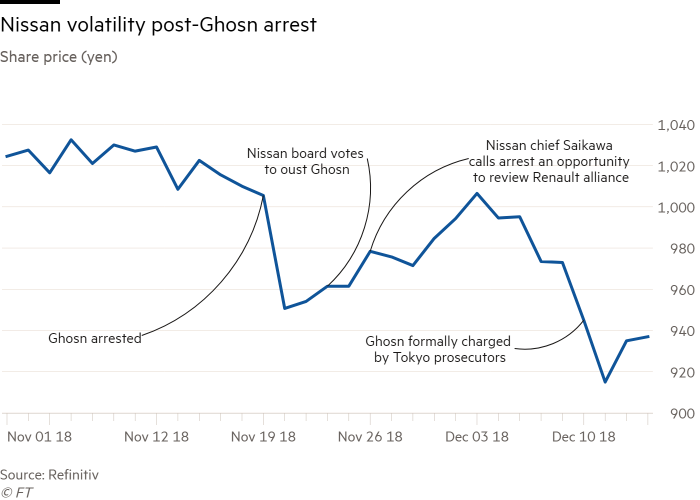On 30 November 2018 while Carlos Ghosn is in police detention, and has been for 12 days without any communication with the outside world, his period in policy custody is extended for another ten days. This surely increased the political pressure during Emmanuel Macron and Shinzo Abe’s meeting at the G20 in Argentina.
The only declaration made by Emmanuel Macron reiterates “his commitment to preserve the Alliance as much as the stability of the Group”.
While not much is happening at the political level, developments accelerate in early December. On 9 December 2018, the Wall Street Journal reveals that Carlos Ghosn was about to replace his CEO Hiroto Saikawa. The same man who was very quick to hold a press conference as soon as his Chairman was arrested on 19 November 2018, where he explained, without consultation, that Nissan’s board of directors would dismiss Carlos Ghosn.
But this is not enough to dampen the zeal of the Japanese prosecutors.
On 10 December 2018, after 22 days in police custody and without access to his lawyers, Carlos Ghosn is officially charged. The reason: under-reporting his income between 2010 and 2014.
The prosecutors “kill two birds with one stone” as they declare the same day a new period of police custody of 10 days for Carlos Ghosn, for the same reason but during the period 2015-2018.
As soon as the next day, Carlos Ghosn’s lawyer, Motonari Otsuru, files a complaint against this extension of police custody. However, it turns out to be in vain as the appeal is rejected immediately.
Furthermore, Greg Kelly suffers the same treatment as he is suspected of having helped Carlos Ghosn. And Nissan announces that as a company it has also been charged with making false disclosures in annual securities reports.
Before the end of this second period of police custody, Renault confirms in two announcements from the board of directors on 13 and 14 December that Carlos Ghosn’s remuneration at Renault between 2015 and 2018 was compliant. It seems that these announcements were made in full knowledge of the case it as les Echos reported earlier that week that Nissan executives travelled from Yokahama to Paris in order to share their internal investigation into Carlos Ghosn. Clearly it was not very convincing because in its two announcements Renault confirms Carlos Ghosn remains as Chairman and CEO.
A decision that was welcomed by the French Prime Minister Edouard Philippe in an interview with the media:
“What is your view on the imprisonment of Carlos Ghosn in Ja[an and the future of the Renault-Nissan group?
Until someone is proven guilty, they a presumed to be innocent. This is the case for Carlos Ghosn. Like a lot of French people, I have learnt about the the severity of the Japanese justice system. I believe that Renault’s board has made the right decisions in recent days.”
Edouard Philippe – French Prime Minister
The gap between Renault and Nissan’s approaches widens: Renault commissions a review of the evidence and shares the results through its board, while Nissan relies on the prosecutors to carry out both tasks.
This gap is exacerbated by Renault’s desire to call an emergency general assembly for Nissan shareholders The state of affairs worries Renault after a review of Nissan’s share price volatility. Nevertheless, the Japanese carmaker drags its feet to prevent Renault from appointing executives that would be able to deliver a turnaround. The announcement for the general assembly occurs at the end of January 2019 but only takes place in April 2019.


